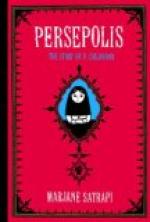Happily for Patrasche—or unhappily—he was very strong: he came of an iron race, long born and bred to such cruel travail; so that he did not die, but managed to drag on a wretched existence under the brutal burdens, the scarifying lashes, the hunger, the thirst, the blows, the curses, and the exhaustion which are the only wages with which the Flemings repay the most patient and laborious of all their four-footed victims. One day, after two years of this long and deadly agony, Patrasche was going on as usual along one of the straight, dusty, unlovely roads that lead to the city of Rubens. It was full midsummer, and very warm. His cart was very heavy, piled high with goods in metal and in earthenware. His owner sauntered on without noticing him otherwise than by the crack of the whip as it curled round his quivering loins. The Brabantois had paused to drink beer himself at every wayside house, but he had forbidden Patrasche to stop a moment for a draught from the canal. Going along thus, in the full sun, on a scorching highway, having eaten nothing for twenty-four hours, and, which was far worse to him, not having tasted water for nearly twelve, being blind with dust, sore with blows, and stupefied with the merciless weight which dragged upon his loins, Patrasche, for once, staggered and foamed a little at the mouth, and fell.
He fell in the middle of the white, dusty road, in the full glare of the sun: he was sick unto death, and motionless. His master gave him the only medicine in his pharmacy,—kicks and oaths and blows with a cudgel of oak, which had been often the only food and drink, the only wage and reward, ever offered to him. But Patrasche was beyond the reach of any torture or of any curses. Patrasche lay, dead to all appearances, down in the white powder of the summer dust. After a while, finding it useless to assail his ribs with punishment and his ears with maledictions, the Brabantois—deeming life gone in him, or going so nearly that his carcass was forever useless, unless indeed some one should strip it of the skin for gloves—cursed him fiercely in farewell, struck off the leathern bands of the harness, kicked his body heavily aside into the grass, and, groaning and muttering in savage wrath, pushed the cart lazily along the road up hill, and left the dying dog there for the ants to sting and for the crows to pick.
It was the last day before Kermesse away at Louvain, and the Brabantois was in haste to reach the fair and get a good place for his truck of brass wares. He was in fierce wrath, because Patrasche had been a strong and much-enduring animal, and because he himself had now the hard task of pushing his charette all the way to Louvain. But to stay to look after Patrasche never entered his thoughts: the beast was dying and useless, and he would steal, to replace him, the first large dog that he found wandering alone out of sight of its master. Patrasche had cost him nothing, or next to nothing, and for two long, cruel years he had made him toil ceaselessly in his service from sunrise to sunset, through summer and winter, in fair weather and foul.




